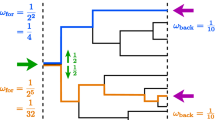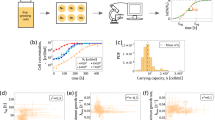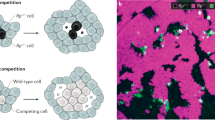Abstract
3H-thymidine labelling and autoradiography were used to compare density dependent inhibition of growth in the cultures of two transformed lines of hamster fibroblasts and in primary cultures of their parent normal cells. Similar manifestations of density dependent inhibition were found in the isolated cultures of normal and neoplastic cells: at saturation densities these cultures had low labelling indices; these indices considerably increased when the cells migrated into the wound from the dense sheet, prelabelled cells seeded on the dense sheets of unlabelled homologous cells did not proliferate. However, proliferation of neoplastic cells was not inhibited when they were seeded on the dense sheet of normal fibroblasts. Thus, neoplastic hamster fibroblasts of both lines retained sensitivity to the inhibiting effect of homologous neoplastic cells but completely lost sensitivity to the inhibiting effect of normal fibroblasts. The possible significance of this selective loss of the sensitivity to normal cells is discussed briefly.
This is a preview of subscription content, access via your institution
Access options
Subscribe to this journal
Receive 24 print issues and online access
$259.00 per year
only $10.79 per issue
Buy this article
- Purchase on Springer Link
- Instant access to full article PDF
Prices may be subject to local taxes which are calculated during checkout
Similar content being viewed by others
Rights and permissions
About this article
Cite this article
Pletyushkina, O., Vasiliev, J. & Gelfand, I. Neoplastic fibroblasts sensitive to the growth inhibition by homologous cells but insensitive to inhibition by parent normal cells. Br J Cancer 31, 535–543 (1975). https://doi.org/10.1038/bjc.1975.94
Issue Date:
DOI: https://doi.org/10.1038/bjc.1975.94



